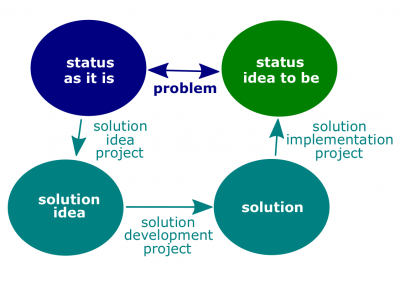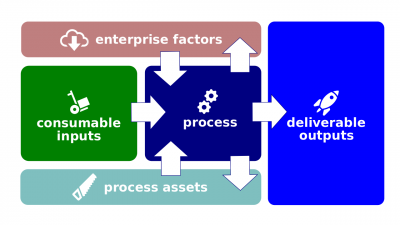Difference between revisions of "What Career Endeavor Is"
(→Script) |
|||
| (23 intermediate revisions by 2 users not shown) | |||
| Line 1: | Line 1: | ||
[[What Career Endeavor Is]] (hereinafter, the ''Lectio'') is the second [[lectio|lesson part]] of the '''[[Career Endeavors]]''' [[lesson]] that introduces its participants to [[career project]]s and related topics. | [[What Career Endeavor Is]] (hereinafter, the ''Lectio'') is the second [[lectio|lesson part]] of the '''[[Career Endeavors]]''' [[lesson]] that introduces its participants to [[career project]]s and related topics. | ||
| − | [[File:Educaship-pipeline.png|400px|thumb|[[WorldOpp Pipeline]]]]This ''lesson'' belongs to the [[Introduction to Careers]] session of | + | [[File:Educaship-pipeline.png|400px|thumb|[[WorldOpp Pipeline]]]]This ''lesson'' belongs to the [[Introduction to Careers]] session of [[EmployableU Concepts]]. |
==Content== | ==Content== | ||
| − | The predecessor [[lectio]] is [[Career | + | The predecessor [[lectio]] is [[Career Strategies]]. |
| − | + | [[File:Solution-project.png|400px|thumb|[[Problem]], [[solution]], and [[project]]]][[File:Process.png|400px|thumb|[[Process]]]] | |
| − | |||
| − | |||
| − | File:Solution-project.png|[[Problem]], [[solution]], and [[project]] | ||
| − | File:Process.png|[[Process]] | ||
| − | |||
| − | |||
| − | |||
| − | |||
| − | |||
| − | |||
===Script=== | ===Script=== | ||
:A [[career endeavor]] is an undertaking to implement the [[career strategy]]. ''Career strategies'' aim to achieve their [[career goal]]s. | :A [[career endeavor]] is an undertaking to implement the [[career strategy]]. ''Career strategies'' aim to achieve their [[career goal]]s. | ||
| − | |||
| − | |||
:Reflecting the [[Work Motivation Model]], these ''goals'' may refer to improvements in [[work-life fit]], [[employee compensation]], [[job task]]s, or, most likely, some combination of those. | :Reflecting the [[Work Motivation Model]], these ''goals'' may refer to improvements in [[work-life fit]], [[employee compensation]], [[job task]]s, or, most likely, some combination of those. | ||
| + | :These ''endeavors'' may be either [[career operations]], which are casually called "old businesses", or [[career project]]s, which are casually called "new businesses". Keeping the current job and continuing skills-building volunteering are examples of ''career operations''. Developing new [[work-related competence|competence]], attaining a [[mentor]], building one's [[employability]], and quitting the current job would be examples of ''career projects''. | ||
| − | [[ | + | :Any ''endeavor'' consists of one or more [[process]]es. A ''process'' is a sequence of [[activity|activiti]]es undertaken in order to achieve particular results. Does it sound complicated? If you need to create an idea of a solution, your time would be an [[input]], all collected available information, as well as your decision-making skills would be your [[asset]]s, legal and ethical considerations can be your [[factor]]s, and an idea would be your [[output]]. |
| − | + | :Ongoing ''operations'' are made up of repetitive ''processes''. ''Projects'' may include some ad-hoc ''activities''. | |
| − | + | :''Project'' [[deliverable]]s are unique and, in most cases, unpredictable. ''Projects'' are undertaken to solve [[some problem]]s. ''Projects'' start with identifying the ''problem'', then designing a solution, and then developing the designed solution. | |
| − | + | :Some ''operations'' may support ''projects''. For instance, continuing allocating time for putting one's foot in doors of promising [[employer]]s is an example of ''career operations''. While putting one's foot in doors of promising [[employer]]s are examples of ''career projects''. Those ''operations'' that support development ''projects'' are called [[DevOps]]. | |
| − | + | ===Key terms=== | |
| + | :[[Career project]], [[career endeavor]], [[career operations]] | ||
| − | + | ===Closing=== | |
| + | :Is the difference between [[career operations]] and [[career project]]s explained well? --Yes/No/I'm not sure | ||
| − | + | '''[[Career Waterfalls]]''' is the successor [[lectio]]. | |
| − | + | ==Questions== | |
| − | |||
| − | |||
| − | |||
| − | |||
| − | == | + | ===Placement entrance exam=== |
Latest revision as of 21:40, 29 October 2023
What Career Endeavor Is (hereinafter, the Lectio) is the second lesson part of the Career Endeavors lesson that introduces its participants to career projects and related topics.
This lesson belongs to the Introduction to Careers session of EmployableU Concepts.
Content
The predecessor lectio is Career Strategies.
Script
- A career endeavor is an undertaking to implement the career strategy. Career strategies aim to achieve their career goals.
- Reflecting the Work Motivation Model, these goals may refer to improvements in work-life fit, employee compensation, job tasks, or, most likely, some combination of those.
- These endeavors may be either career operations, which are casually called "old businesses", or career projects, which are casually called "new businesses". Keeping the current job and continuing skills-building volunteering are examples of career operations. Developing new competence, attaining a mentor, building one's employability, and quitting the current job would be examples of career projects.
- Any endeavor consists of one or more processes. A process is a sequence of activities undertaken in order to achieve particular results. Does it sound complicated? If you need to create an idea of a solution, your time would be an input, all collected available information, as well as your decision-making skills would be your assets, legal and ethical considerations can be your factors, and an idea would be your output.
- Ongoing operations are made up of repetitive processes. Projects may include some ad-hoc activities.
- Project deliverables are unique and, in most cases, unpredictable. Projects are undertaken to solve some problems. Projects start with identifying the problem, then designing a solution, and then developing the designed solution.
- Some operations may support projects. For instance, continuing allocating time for putting one's foot in doors of promising employers is an example of career operations. While putting one's foot in doors of promising employers are examples of career projects. Those operations that support development projects are called DevOps.
Key terms
Closing
- Is the difference between career operations and career projects explained well? --Yes/No/I'm not sure
Career Waterfalls is the successor lectio.


